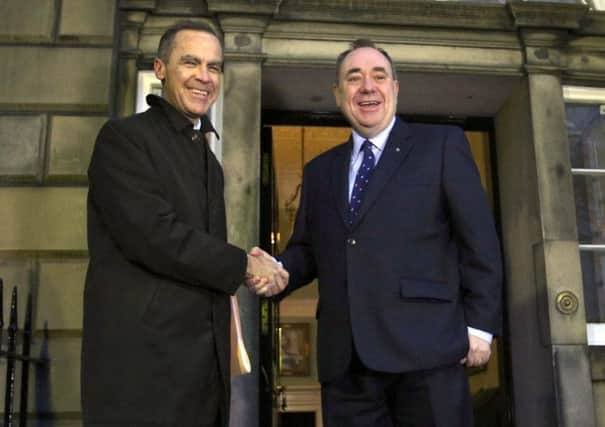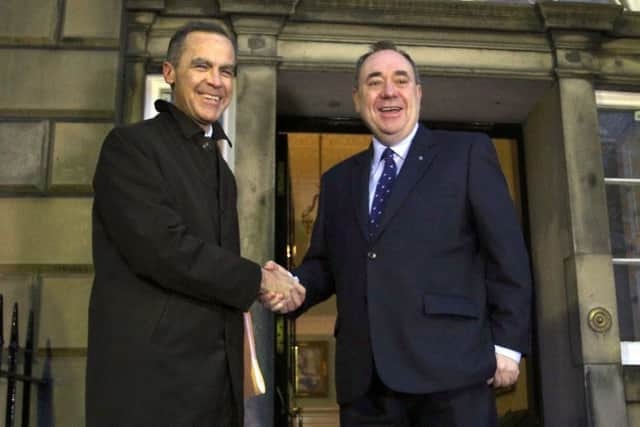SNP accept currency union means loss of powers


The admission came after Bank of England Governor Mark Carney warned an independent Scotland would have to surrender key economic levers to join in a currency union.
It is understood the UK authorities could retain control over interest rates and exchange rates, and that limits could be applied to taxation and spending.
Advertisement
Hide AdAdvertisement
Hide AdMr Carney was in Edinburgh to meet Alex Salmond for the first time yesterday to discuss the First Minister’s controversial plans to operate a currency union with the rest of the UK.


Mr Carney indicated that after independence, the new Scottish government would have to sacrifice control over some economic levers for a currency union to succeed.
Addressing an audience of business figures after meeting Mr Salmond at Bute House, Mr Carney said a durable, successful currency union would require “some ceding of national sovereignty” by Scotland.
The Governor said an independent Scotland would have to share risks with the rest of the UK in order to prevent a eurozone-style meltdown, which had resulted from differing economic performances and debt crises across the EU.
A spokesman for the Scottish Government admitted that it would have to work within a strict economic framework to ensure Mr Salmond’s plans for a “sterling zone” were workable.
A Scottish Government spokesman accepted Mr Carney’s point that there would have to be a sharing of risk and fiscal stability across Scotland and what remained of the UK.
“Any independent government looks at pooling sovereignty on a range of fronts,” the spokesman said. “This is done when it is in the country’s interests to pool sovereignty, and rules and structures are put in place. We would still be responsible for our own taxation.”
Last year, the Scottish Government’s fiscal commission working group outlined its plans for a macroeconomic framework, including a fiscal sustainability agreement that would involve both governments and covering net borrowing and debt.
Advertisement
Hide AdAdvertisement
Hide AdYesterday, the veteran independence supporter Margo MacDonald questioned whether the loss of powers required to maintain a currency union would allow a future independent government to achieve its economic ambitions.
She said: “In terms of what the Scottish Government wants to do, in terms of building up the economy, it is possible there would be too much sovereignty lost to do that. But we will not know until we go into negotiations.
“The main thing I have drawn from this is that the Governor of the Bank of England is taking this seriously. And that’s all that Alex Salmond needs to know.”
In his speech to the Scottish Council for Development and Industry at Edinburgh’s George Hotel, Mr Carney said a currency union would result in the “large cost” of Scotland giving up an independent monetary policy that gives ministers power to alter interest and exchange rates.
He also argued that a currency union could amplify fiscal stress, increasing the risks of financial instability.
“In the extreme, adverse fiscal dynamics could call into question a country’s membership of the union, creating the possibility of self-fulfilling ‘runs’ on bank and sovereign debt. Such adverse feedback loops turned recessions into depressions in several European countries in recent years.”
In order to prevent such economic difficulties, Mr Carney said there should be free movement of labour, capital and goods across borders. He pointed out that there were many similarities between the Scottish and English economies, but warned the creation of a border could have an impact.
“A word of caution applies here,” Mr Carney said. “There is a body of evidence that national borders can influence trade flows, even between highly integrated economies.”
Advertisement
Hide AdAdvertisement
Hide AdThe Governor also underlined the importance of a banking union to a successful currency union, He said the existing banking union between Scotland and the rest of the UK was “durable and efficient”. Having the Bank of England as a lender of last resort had enabled Scotland to support a large banking sector.
“These arrangements help ensure that Scotland can sustain a banking system whose collective balance sheet is substantially larger than its GDP,” he said.
The importance of a stable fiscal policy – which includes taxation, spending and borrowing – was also emphasised.
Sharing fiscal arrangements would reduce the threat of a member of the currency union defaulting. Past experience had seen stronger countries bail out weaker ones, because it was in everyone’s economic interests. That had reduced the incentive for countries to run prudent finances.
Mr Carney said “this moral hazard problem” suggested the need for “tight fiscal rules” to enforce prudent behaviour.
Throughout his speech, the Governor stressed it would be up to the two governments to negotiate a currency union and he was merely offering a technical assessment of the economic arrangement.
But opponents of independence said his remarks contradicted Mr Salmond’s claims of full autonomy.
Scottish Conservative leader Ruth Davidson said: “Alex Salmond has repeatedly claimed a separate Scotland could have its cake and eat it. That under independence, the country could have a currency union with the rest of the UK, but still have total fiscal control.
Advertisement
Hide AdAdvertisement
Hide Ad“Now, the Governor of the Bank of England has blown this assertion right out of the water.”
A Treasury spokesman said: “Governor Carney highlights the principled difficulties of entering a currency union: losing national sovereignty, practical risks of financial instability and having to provide fiscal support to bail out another country.
“This is why the UK government has consistently said that in the event of independence, a currency union is highly unlikely to be agreed. The Scottish Government needs a Plan B.”
The SNP, however, welcomed Mr Carney’s statement that he would work to implement whatever arrangements the two governments negotiated.
Finance secretary John Swinney said: “Mr Carney provides a serious and sensible analysis of how a currency union can work, and every one of the points he cites in terms of the technical requirements has been examined by the Fiscal Commission.”
Analysis by Matt Qvortrup: Three options for a currency union to stand test of time
Mark Carney, Governor of the Bank of England, was diplomatic when he met the First Minister.
As a Canadian, Mr Carney is well aware that any intervention would be scrutinised and spun by both sides of the argument. He said the British and Scottish Governments needed “to consider carefully what the economics of currency unions suggest are the necessary foundations for a durable union”.
Advertisement
Hide AdAdvertisement
Hide AdSo what are the options? There are basically three. The first is that the Bank of England becomes a supranational institution with representatives from both independent countries.
This is the option favoured by the current Scottish Government, but it is opposed by the coalition government, as they fear that an independent Scottish Government might be more fiscally generous than a Conservative-led London one.
If it becomes impossible to establish a supranational Bank, an independent Scotland could do the same as El Salvador and Ecuador in relation to the US dollar.
Similar to these two Latin American countries, Scotland could simply use English banknotes. However, that might not be palatable for a newly independent Scotland.
The third option is a so-called “Hong Kong solution”.
The Hong Kong dollar was pegged to the American dollar. In fact, this is very much the situation today. Since the Banknote (Scotland) Act of 1845, Scottish banks such as RBS, Bank of Scotland and Clydesdale Bank have had the right to issue notes, on the condition that they hold an equivalent quantity of English banknotes.
Similarly, the Hong Kong Monetary Authority has at any given time a reserve of American dollars equal to the amount of Hong Kong dollars in circulation.
In the event that an independent Scotland cannot reach an agreement with London, the Hong Kong option would be a possible solution, though one that would require a high level of fiscal stability in Scotland.
So, which one did Mr Carney favour?
He did not say directly. But given the words, “necessary foundations for a durable union”, it seems that he assumes the best option is for the Bank to become a supranational institution.
Advertisement
Hide AdAdvertisement
Hide AdIn other words, Mr Carney is closer to the position of the Scottish Government. But he was careful not to say this too explicitly.
• Dr Matt Qvortrup is a referendum expert. He is an award-winning lawyer and political scientist and writer.
SEE ALSO